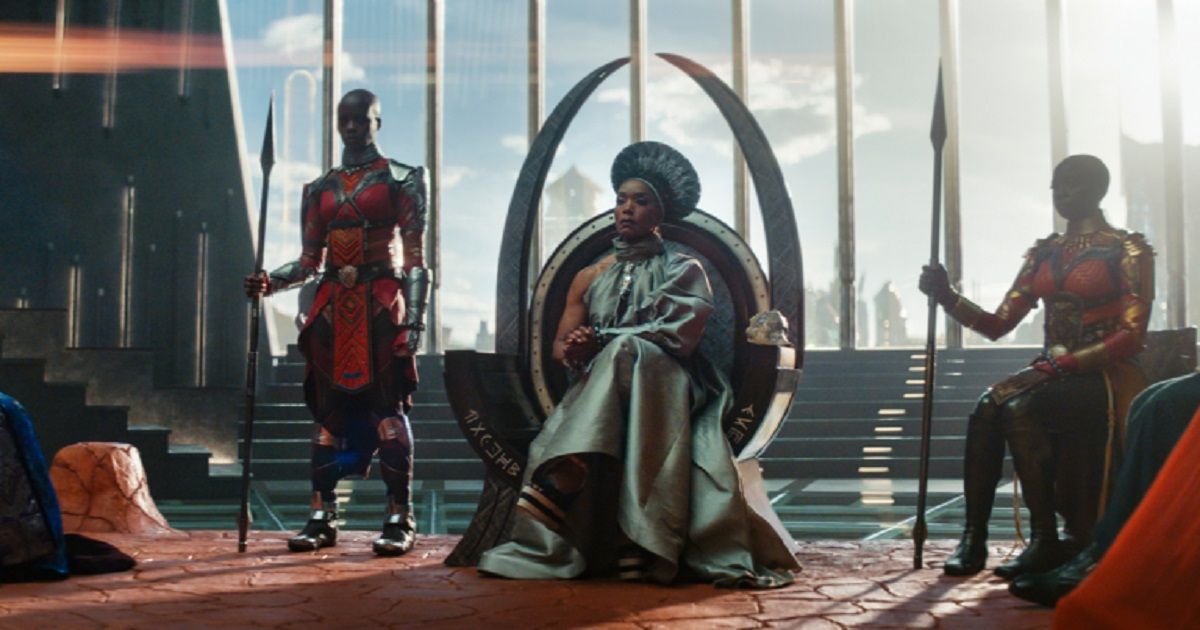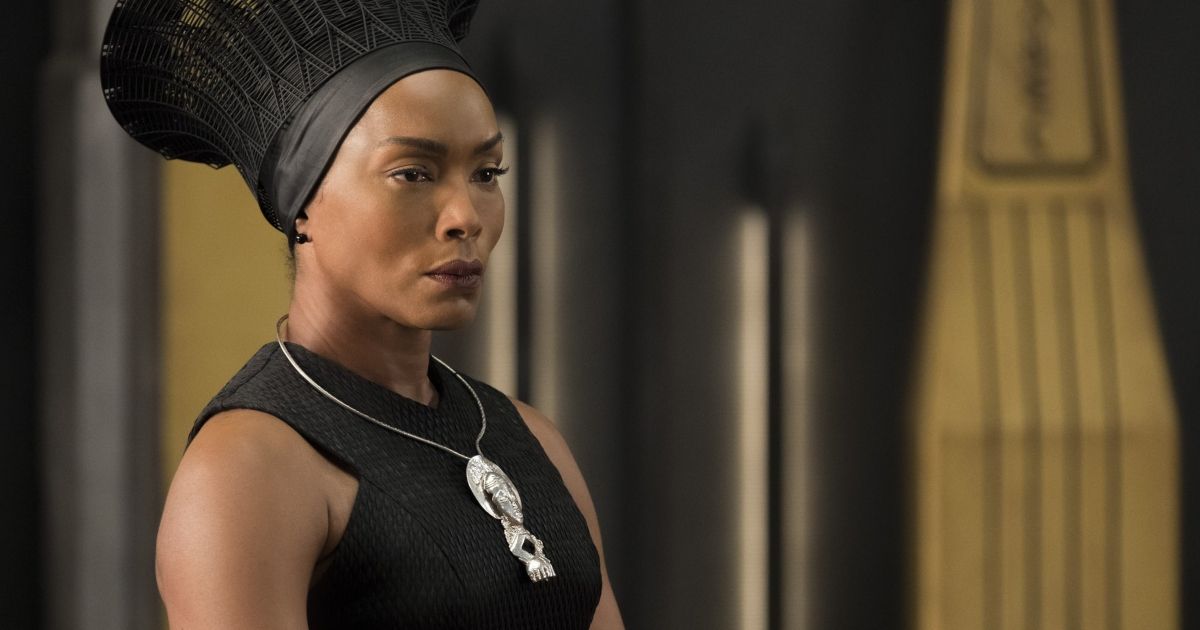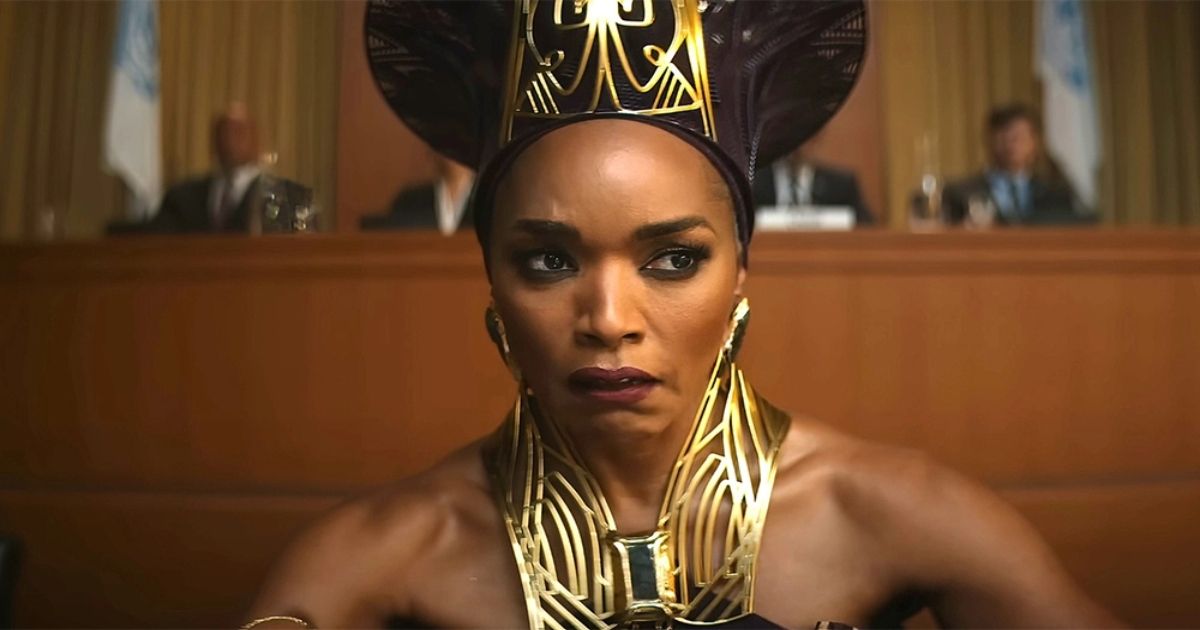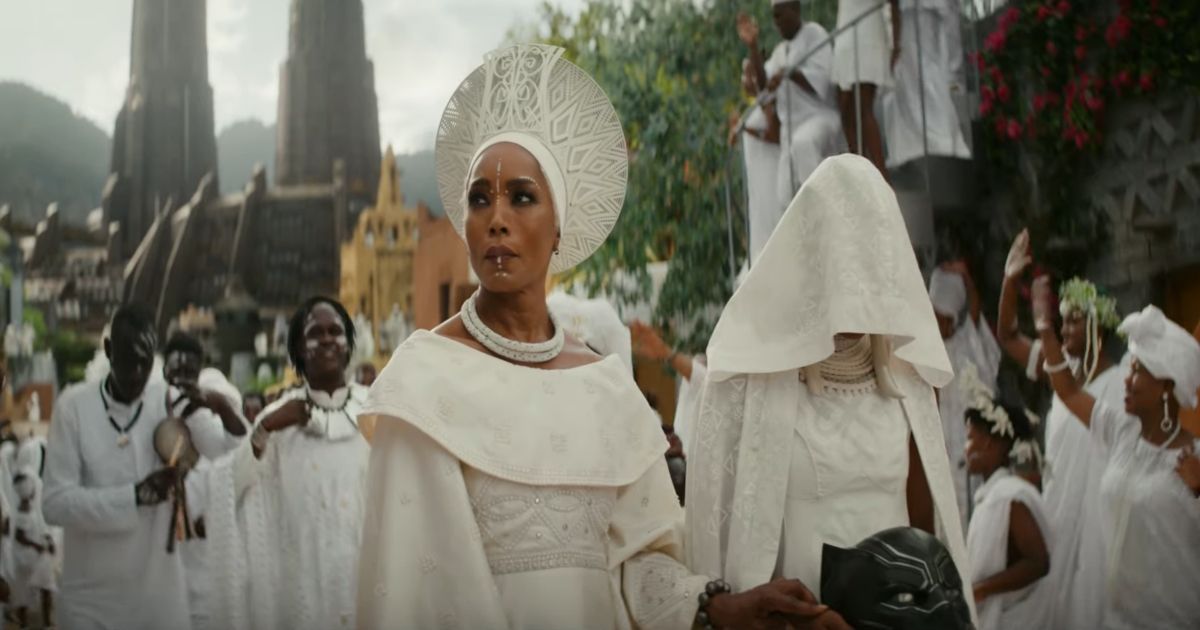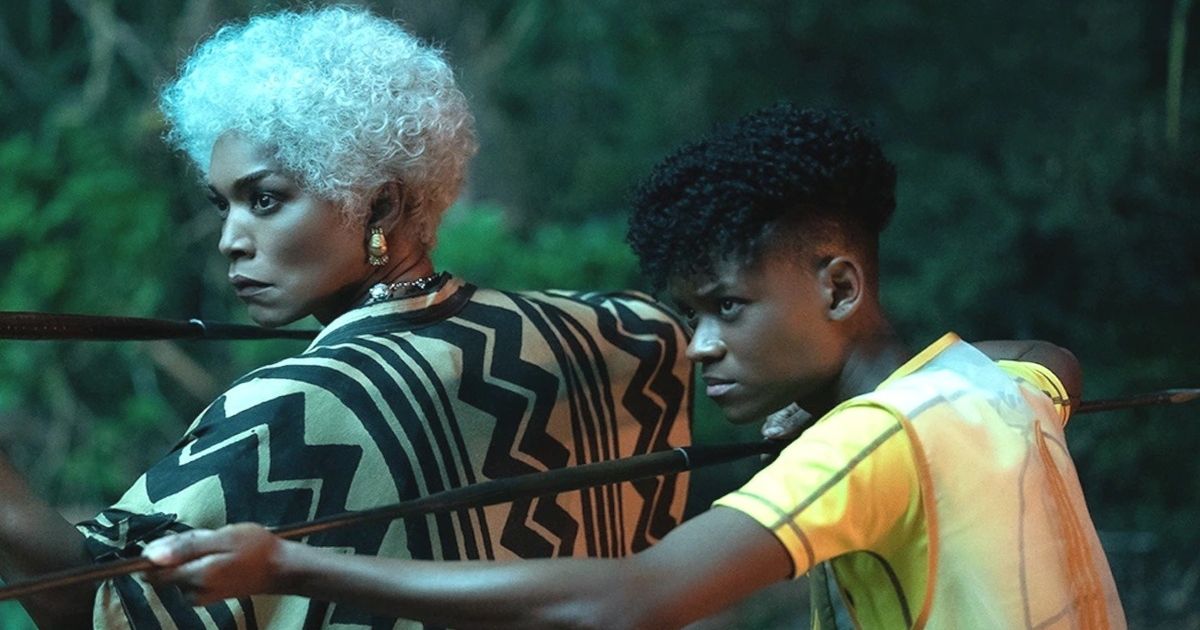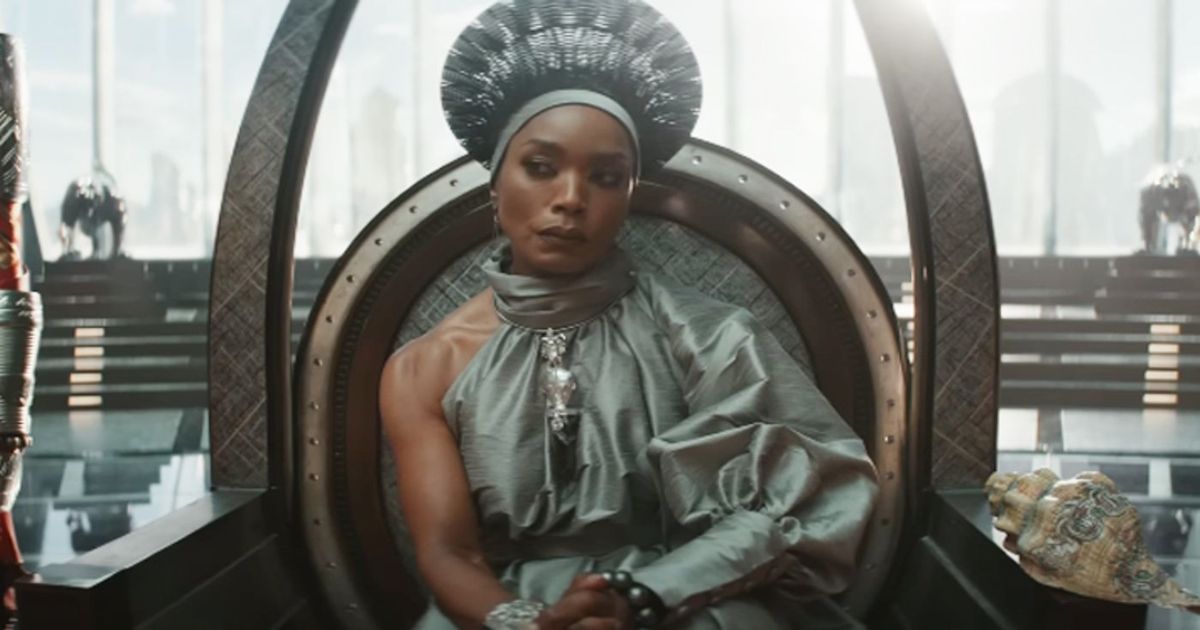This article contains spoilers for Black Panther: Wakanda ForeverAngela Bassett is a legendary actress at the height of her incredible talents in Marvel Studios the Black Panther: Wakanda Forever. Having come to power after the death of her son, the Black Panther, King T'Challa, Bassett embodies the fearless essence of Queen Ramonda, de facto ruler of Wakanda, and gives an Oscar-worthy performance that must be seen to be truly appreciated. While comic book films are not often regarded as worthy of Oscar gold due to their focus on popcorn-frenzied fanfare, Bassett's territorial display of motherhood speaks to the truest sense of mother's everywhere who are ready to hold it down in a moments notice, no matter the cost, and to protect the kingdoms of their future Kings and Queens.
Under Bassett, Queen Ramonda stands as a guiding light for the spirit of her culture, and Bassett's performance, worthy of the highest accolade in all of Hollywood, touches on powerful themes that not only resonate with audiences around the world, but transcend the nature of comic book films, leaving us with only one conclusion; Angela Bassett deserves her flowers, and an Oscar nomination, here's why.
The Queen Mother
To the well-initiated, Angela Bassett's talent is widely respected, and she has a history of powerhouse performances worthy of celebration. Since getting her start in the mid 80s with debuts in made-for-tv films, Bassett's career has blossomed, becoming one of the most iconic actresses in the world. Her career hit a major high with 1993's What's Love Got To Do With It, the Tina Turner autobiographical film that earned Bassett a Golden Globe victory, the first of her career, and an Oscar nomination. On December 7th of this year, Bassett was named to The Hollywood Reporter's Women in Entertainment Power 100, highlighting an excellence that has spanned decades.
As Queen Mother, Bassett channels the best aspects of her formidable talent into the character of Ramonda, leading her with a fierce loyalty to the kingdom of Wakanda. When the world threatens to plunder her nation, Queen Ramonda is the one who stands as the face of her people, guarding the riches of her culture. Borrowing from modern day themes, and the experience of Black women around the world who stand as a bulwark against injustice, prejudice, violence, and the theft of Black culture by predatory influence, Bassett's rendering of Queen Ramonda goes deeper than what many might-at-first regard as just another comic book movie.
To Get to the King, You Gotta' Go Through Her
After the first Black Panther film became a worldwide phenomenon in 2018, fans were left reeling after the untimely death of Chadwick Boseman in 2020. Boseman's version of King T'Challa served as the ideal persona of the Black Panther, and his loss left a void in the Marvel universe that to this day remains unfulfilled. Wakanda Forever, in respect to Boseman's iconic performance as the King of Wakanda, did not recast the character, choosing instead to mirror reality by allowing King T'Challa to pass away into the ancestral realm, leaving Queen Ramonda as the matriarchal guardian of the technologically advanced nation.
In the film, this void is felt, and the loss of the king is like a wound that leaves Wakanda vulnerable. But, standing in T'Challa's place, Queen Ramonda addresses the world council to assure them that the kingdom is strong, and that attacks against Wakanda will not be successful. Channeled through Bassett's awe-inspiring monologue, Queen Ramonda directs her fury at the enemies of her people, while Director Ryan Coogler intercuts powerful imagery of Okoye, the general of the Dora Milaje, and her soldiers, as they emerge from the dark, ready to defeat a new threat in the search for vibranium technology. Thematically, Bassett utilizes Ramonda's distinguished role as Queen of her universe to highlight the real world leadership of Black women as they defend the honor of their kings, and protect them from hostile forces hell-bent on destroying their legacies throughout the world.
Sacrifice for the Future
Motherhood is not only a major theme in Black Panther: Wakanda Forever; it's a call to action. The major storyline in the film follows Shuri, played by Leticia Wright, as she mourns the death of her brother, King T'Challa. In the search for the scientist responsible for creating detectors capable of finding vibranium from other sources outside of Wakanda, Shuri is allowed to leave Wakanda with reluctant permission from Queen Ramonda, who commands Okoye to protect Shuri, and bring her home safe. When Shuri finds Riri, the scientist who shares an uncanny brilliance with Tony Stark, they're attacked by the Talocan, an undersea civilization led by mutant Marvel villain, Namor. In the battle, Shuri is lost, and Queen Ramonda's fury is unleashed upon Okoye, as Bassett, in one of the most explosive and spell-binding performances ever to grace a Marvel film, commands the screen with an unrivaled sense of maternal bloodlust.
To Bassett's Queen Ramonda, motherhood is a responsibility that requires action over words, and serves as a deeper thread than just blood alone. When Namor attacks Wakanda by drowning the nation under an ocean of water, the Queen Mother rescues Riri by sacrificing her own life to save what is inarguably the future of Wakanda. This theme is, again, brilliantly augmented by Coogler, who creates the visual motif of Queen Ramonda swimming upward toward renewed breath and life, only to realize that Riri drowns beneath her, choosing instead to rescue the young visionary in place of herself. Likewise, Bassett's rendering of Queen Ramonda's grace and patience in establishing the future of her nation is a secret that includes the heir to T'Challa himself, and it's Ramonda's level-headed leadership, vision, and clairvoyance that allows for the next king of Wakanda, still a child, to live in obscurity until he can be safely vaulted to the throne under the watchful eyes of his own mother, Nakia, a spiritual successor to Bassett's Queen Ramonda.
Comic Book Movies are Cinema, Too
A recent trend bashing the worthiness of comic book movies as cinema has taken ahold of certain circles within Hollywood. Unsurprisingly, many of these viewpoints, whether purposefully or not, seek to unfairly diminish the tremendous vision, sacrifice, and creative artistry that modern day comic book films nurture. As illustrated above, many of the themes that Black Panther: Wakanda Forever explores have real world relevance, and speak culturally to millions of fans around the world. The impact of these films, often considered juvenile, should not be dismissed as unworthy of cinematic value. While true that cinema is an art form, that definition does not exclude comic book films, and more importantly, should not be defined by an older generation of film aficionados, or by the movie brats alone.
Taken at face value, Angela Bassett's performance in Wakanda, would in any other circumstance be respected as career-defining. While an Oscar nomination is not the only game in town, it is still often regarded as the highest honor in Hollywood, and should not be withheld from Bassett's turn as Queen Ramonda simply due to the genre in which it took place. There's enough room in cinema for comic book films and the career-defining performances that stand out in them.
A Powerful & Worthy Performance
Angela Bassett's performance in Wakanda is powerful, poignant, and serves as an artistic, culturally relevant rendering, in spite of being couched within a superhero narrative. Cinematically, the Wakanda film allows Bassett, as Queen Ramonda, to speak to current day events by exploring the themes of motherhood in service to the protection of Black culture from outside forces that wish it harm, while shepherding, and sacrificing oneself for the visionary leaders of our future. Defining the cultural zeitgeist of our time, Bassett's prowess as the true spirit of Ramonda further illustrates the role that powerful women play in shaping the destinies of all who come before them, and it is this sense of rich, character development, coupled with a rare talent in Bassett herself, that rivals the best that cinema has to offer, regardless of genre, and compels us to give flowers where flowers are due. Now, give Angela Bassett that Oscar.

